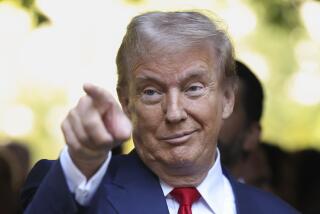Op-Ed: Cronies, tariffs and sex scandals: Warren Harding was a lot like a certain someone we know
No one ever thought Warren Harding, who died exactly 95 years ago, had the capacity to become president of the United States. But he did look presidential. He was tall, handsome, always well dressed and well groomed, and an avid golfer. Plus, he gave robust, if vague, speeches about “returning America to normalcy” that appealed to a war- and recession-weary electorate. In the election campaign of 1920, he championed three issues: tax cuts, immigration cutbacks and tariffs on trade. He also promised to roll back the progressive legislation of his predecessors.
Doesn’t that sound like a certain someone we know?
Harding had other similarities to Donald Trump. He persuaded Congress to pass tax cuts that helped bankroll the Roaring ’20s. The Revenue Act of 1921 reduced the marginal tax rate on the rich from 73% to 58% and the capital gains tax to 12.5%. It also eliminated the excess profits tax that was enacted to help finance World War I. On a percentage basis, these cuts were much larger than Trump’s. Two subsequent acts lowered the top tax rate all the way down to 25%.
On the trade front, Harding pushed for higher tariffs. He espoused “scientific” tariffs that would prohibit foreigners from selling goods at prices below U.S. production costs. The Emergency Tariff of 1921 slapped high tariffs on imported corn, wheat, sugar, wool and other agricultural products. The Fordney-McCumber Tariff of 1922 raised levies even higher. These actions cut imports dramatically and sparked a predictable trade war. France raised its tariffs on American cars from 45% to 100%. Spain, Germany and Italy also hiked their rates.
Although he promised to appoint the most qualified people to his administration, he surrounded himself with business cronies and relatives.
As for immigration, Harding championed the Per Centum Act of 1921 that had been vetoed by his predecessor, Woodrow Wilson. That legislation had the effect of reducing the flow of immigrants to the U.S. from 800,000 in 1920 to only 300,000 in 1922.
On the global stage, Harding was a champion of “America First” and opposed our entry into the League of Nations.
Harding even suffered from some of the same managerial failings as Trump. Although he promised to appoint the most qualified people to his administration, he surrounded himself with business cronies and relatives. His attorney general, Harry Daugherty, was impeached for self-dealing and corruption. His brother-in-law, the superintendent of federal prisons, faced similar accusations. His director of the Veterans Bureau, Charles Forbes, was later convicted of defrauding the government and sent to prison. His legal counsel, Charles Cramer, was accused of corruption and committed suicide in 1923. His campaign manager resigned from the U.S. Shipping Board after selling surplus government-owned ships for pennies on the dollar to friends. And, most famously, his Interior secretary, Albert Fall, orchestrated the Teapot Dome scandal and is the only sitting Cabinet member to have been sent to prison.
These and other scandals reflected Harding’s preference for hiring on the basis of personal relationships rather than ability.
And last, but far from least, of the similarities to Trump: Harding’s philandering. He had a 15-year affair with a friend’s wife, Carrie Phillips, that reached into his White House years, and an intense affair with Nan Britton, which began in a New York hotel room and continued in a White House cloakroom. He paid both women to keep silent about their affairs. The Republican National Committee paid Carrie Phillips $5,000 a month to keep quiet on top of an initial gift of more than $20,000. Nan Britton got a lot less. But she gave birth to a daughter, whom Harding supported with $500 a month (often hand-delivered by the Secret Service), plus extra cash when they got together.
Enter the Fray: First takes on the news of the minute from L.A. Times Opinion »
Harding adamantly denied ever having those affairs. He also denied fathering Nan Britton’s child. All his political associates stuck to that story. But after his death, those associates stopped making payments to Nan Britton and her daughter. So Nan wrote a book (“The President’s Daughter”) that bared all the sordid details of their long relationship. Still, Harding’s family and associates claimed her story was fake news and vehemently rejected her allegations. It wasn’t until 2015, 90 years later, that DNA tests proved Harding had lied about his paternity.
Harding died on Aug. 2, 1923. Tabloids at the time suggested that his wife, Florence, might have poisoned him in retribution for his philandering. But historians have suggested he more likely succumbed to a heart attack.
Historians consistently rate Harding as one of the worst U.S. presidents and often speculate that he would have been impeached had he lived longer. In what might be taken as a cautionary tale for President Trump, President Harding expressed frustration about the scandals that enveloped his administration: “I have no trouble with my enemies. I can take care of my enemies all right. But my damn friends, my god-damned friends … they’re the ones who keep me walking the floor nights.”
Brad Schiller is an emeritus professor of economics at American University and the author of “The Economy Today.”
Follow the Opinion section on Twitter @latimesopinion or Facebook
More to Read
A cure for the common opinion
Get thought-provoking perspectives with our weekly newsletter.
You may occasionally receive promotional content from the Los Angeles Times.










